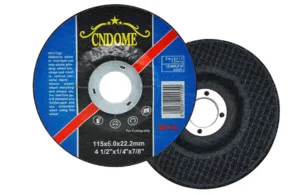In the world of machining and fabrication, the importance of precision and efficiency cannot be overstated. Whether it’s in manufacturing, automotive, aerospace, or any other industry, achieving smooth finishes and accurate dimensions is crucial. One tool that plays a vital role in this process is the silicon carbide grinding wheels. With its remarkable properties and capabilities, it has revolutionized the way materials are shaped and finished.
What is Silicon Carbide?
Silicon carbide (SiC) is a compound made up of silicon and carbon atoms. It’s known for its exceptional hardness and thermal conductivity, making it ideal for a wide range of applications. In its natural form, silicon carbide exists as a rare mineral called moissanite, but it’s primarily synthesized for industrial use. Its hardness is surpassed only by diamond, making it an excellent abrasive material.
Properties and Advantages:
- Hardness: Silicon carbide is renowned for its extreme hardness, which allows it to efficiently grind and cut through even the toughest materials. This property ensures long-lasting performance and consistent results, reducing the need for frequent wheel replacements.
- Heat Resistance: Unlike conventional abrasive materials like aluminum oxide, silicon carbide exhibits superior heat resistance. This characteristic is invaluable during high-speed grinding operations, where heat buildup can compromise the integrity of the workpiece. Silicon carbide grinding wheels dissipate heat effectively, minimizing the risk of thermal damage to both the wheel and the workpiece.
- Abrasive Performance: Silicon carbide grains have sharp edges and fracture easily, ensuring aggressive material removal while maintaining a smooth surface finish. This translates to shorter machining times and enhanced productivity, making silicon carbide grinding wheels a preferred choice for demanding applications.
- Versatility: Silicon carbide grinding wheels are versatile and can be used for various materials, including metals, ceramics, stone, and composites. Whether it’s shaping, smoothing, or sharpening, these wheels excel across a wide spectrum of materials and applications, offering flexibility to machinists and fabricators.
Applications:
- Metal Fabrication: Silicon carbide grinding wheels are extensively used in metalworking applications for tasks such as deburring, edge chamfering, and surface grinding. They are particularly effective for hard metals like titanium, stainless steel, and cast iron.
- Tool Sharpening: Machinists rely on silicon carbide wheels to sharpen cutting tools such as drills, end mills, and lathe bits. The aggressive nature of silicon carbide ensures precise sharpening and extends the lifespan of expensive cutting tools.
- Stone and Concrete Work: In construction and masonry, silicon carbide grinding discs are employed for shaping and polishing stone, concrete, and masonry materials. They provide excellent material removal rates while maintaining the integrity of delicate surfaces.
- Semiconductor Industry: Silicon carbide grinding wheels play a critical role in the semiconductor industry for shaping and finishing silicon wafers. Their ability to maintain tight tolerances and achieve ultra-smooth surfaces is essential for the production of high-quality semiconductor devices.
Conclusion:
Silicon carbide grinding wheels represent a pinnacle of abrasive technology, offering unparalleled hardness, heat resistance, and abrasive performance. From metalworking to stone polishing, these wheels have become indispensable tools across various industries. As technology continues to advance, silicon carbide abrasives will likely remain at the forefront, enabling precision machining and superior surface finishes for years to come.


